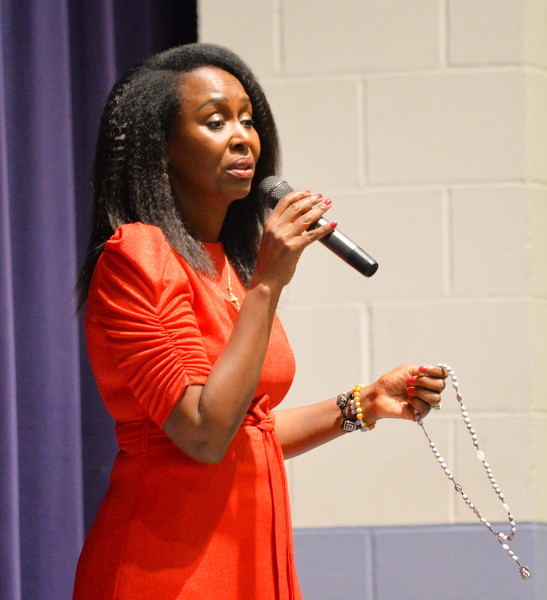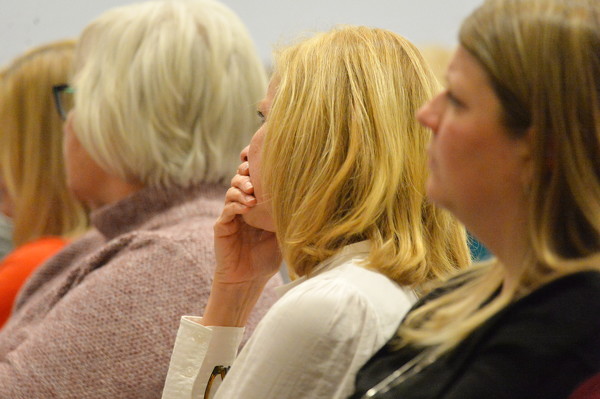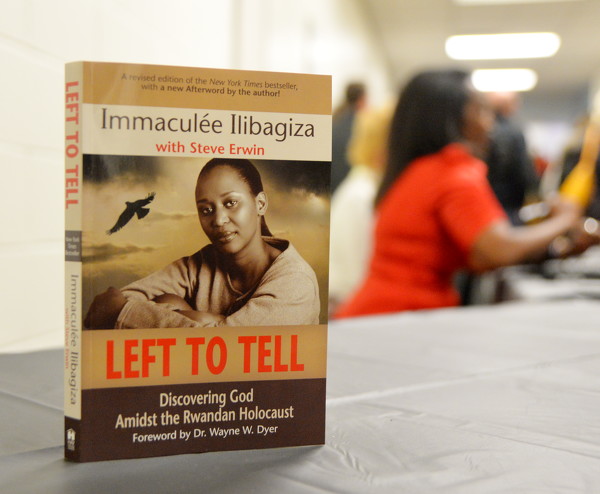Monday, April 4th, 2022
Genocide survivor's tale of terror
Woman among 8 who hid from deadly rebels
By Erin Gardner

Photo by Paige Sutter/The Daily Standard
Immaculee Ilibagiza, a Rwandan genocide survivor, tells her story to an audience of 200 people at the Montezuma Spiritual Center Friday evening.
MONTEZUMA - Immaculee Ilibagiza has a way of putting things into perspective.
Being on her feet for two hours while speaking before a room of 200 people about her experience surviving the Rwandan Genocide was small potatoes.
"The genocide was terrible," Ilibagiza said to a crowd at the Spiritual Center of Montezuma. "Wars are terrible, but somehow something has a way of teaching us so many lessons. Otherwise, we don't learn a normal life."
Ilibagiza spoke of her experience as a genocide survivor and her journey with her faith during the program held Friday at the center.
In 1994, a million people in the African country of Rwanda were brutally murdered in what is now known as the Rwandan Genocide, according to information from Ilibagiza's website. According to the United States Holocaust Memorial Museum, in 1994, Rwanda's population of 7 million was composed of two major ethnic groups: Hutus which represented roughly 85% of the population and Tutsis which made up 14%.
The war was sparked on April 6 when the Rwandan President's plane was shot down over the capital city of Kigali. A Hutu extremist-led government launched a plan to murder the country's entire Tutsi minority and any others who opposed the government's policies. The president's assassination sparked months of massacres of Tutsi tribe members throughout the country.

Photo by Paige Sutter/The Daily Standard
Immaculee Ilibagiza, a Rwandan genocide survivor, talks to an audience at the Montezuma Spiritual Center Friday evening.
"It is really great to be here," Ilibagiza said, describing the warmth of the area. "I really love this place. Every home we were passing by had statues of Mary, Our Lady. Where I come from, we love Our Lady very much. I feel home."
Ilibagiza, a Tutsi, said she was at the wrong place at the wrong time.
On April 7, 1994, she was home for Easter break from the National University of Rwanda where she was studying electrical and mechanical engineering. She woke up to her brother telling her of the assassination.
"I knew we were going to die," Ilibagiza said.
To protect his only daughter from rape and murder, Ilibagiza's father told her to run to a local pastor's house for protection, according to information from Ilibagiza's website. The Hutu pastor sheltered Ilibagiza and seven other women in a hidden 3-foot-by-4-foot bathroom for 91 days.
She later learned her entire family - her mom, dad and two brothers - had been killed. She has one surviving brother who was studying abroad.
"When you think things are bad, they can get worse," Ilibagiza said.
Ilibagiza said the seven women excluding herself never spoke the entire time they were hiding. The women ranged from 7 to 55 years old. It was three days before the pastor could bring the women food.
"Complaining does not help," Ilibagiza said. "You can blame, you can fight, any excuse, but it does not change the situation. But if you face what you have and see what you can do about that, then you can come out of that."
Ilibagiza said she was so angry about the situation and over time, her anger became obsessive and like a sickness.
When the rebels reached the house, they had machetes, spears and grenades, Ilibagiza said. The only thing she could think was that her life was over.
"How am I going to die?" she said. "Am I going to see Jesus? And then I started to imagine how they would kill me. Are they going to shoot me? Are they going to cut me to pieces? The fear was paralyzing. Waiting for them to find me, it was so painful. (It felt) like a thousand needles were going through my body, like I am going through fire."

Photo by Paige Sutter/The Daily Standard
The audience listens as Immaculee Ilibagiza tells her harrowing story.
Through the agony and fear, she heard two voices in her head - one was telling her to open the door and get it over with and another told her to ask God for help. Ilibagiza decided to listen to the second voice and and lifted up her worries to God.
"Do you know who God is," she said, describing what the voice told her. "Do you remember? God is almighty. Do you know what almighty means? It means he can do anything. Do you know what anything means? It means even if they find you, they will not touch you. Even if they open this bathroom, they will not be able to see you. Even if they shoot you, the bullet won't go through you."
She turned over her destiny to God and asked for a specific sign because she didn't want to call it luck.
She said, "I remember asking God 'If you can you hear me … please don't let the killers open the door of the bathroom. Just today. If they don't open it today, I will know that it is you who did it and if I know you did it, I promise you I will sit here all my life.'"
Ilibagiza fainted and woke up five hours later to the pastor telling her what the rebels did.
She said the pastor told her there were 300 to 400 rebels outside, but 50-100 rebels came into the house to search. They searched in every room, under the beds, in closets, in suitcases and in the attic to make sure no refugees were hiding.
"They came right to the door of the bathroom," Ilibagiza said. "One of the killers touched the handle before he opened (it and) looked at (the pastor) and said, 'You know what? We trust you. You are a good man. There is no way you can hide these people. You are a good citizen.' They turned around and they left."
Ilibagiza took that as her sign and devoted her life to God.
"God heard me! In a bathroom, not in a church," she said.
She began reading the Bible and saying the rosary. While she was strengthening her faith, she asked God why he created her and why he loved her. She also explored the concept of Heaven and started learning about forgiveness. She decided she wanted Heaven because she was in hell already.
Ilibagiza said forgiveness was a hard concept to learn because she was angry and wanted to avenge the death of her family members.
When she prayed the Our Father, she was stuck on the lines about forgiveness; she couldn't say them and mean them, she said.
"He said 'Forgive them, Father, they know not what they do.' (Jesus) not only (forgave) them but (made) an excuse for them. When I saw what he said (that) they don't get it, I felt like he was speaking to my heart."
Ilibagiza said she understood forgiveness at that moment. She said she forgave the killers because they didn't know what they did and she was in no place to judge them - that was God's job.
She realized that if she can learn forgiveness, the killers can come to God and devote their lives to peace and love. She visited the man who killed her family. He was in prison at the time. She said she told him she forgave him.
In 1998, Ilibagiza moved to the United States where she continued her work for peace through the United Nations, according to her website. In 2006, she wrote, "Left to Tell: Discovering God Amidst the Rwandan Holocaust." It became a New York Times bestseller, has been translated into 17 languages and has sold nearly two million copies.
"What I love is to share my faith," Ilibagiza said. "There's no better job than a job that cares about other people … Love God (and) say the Rosary."
Ilibagiza signed copies of her book after the talk.

Photo by Paige Sutter/The Daily Standard
Immaculee Ilibagiza, a Rwandan genocide survivor, wrote 'Left to Tell: Discovering God Amidst the Rwandan Holocaust.' She told her story to an audience of 200 people at the Montezuma Spiritual Center Friday evening.




